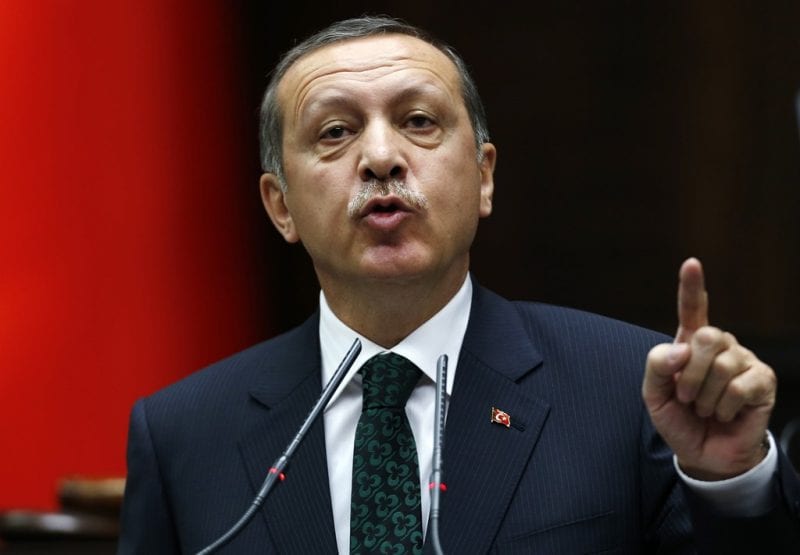U.S. Again Supports Al Qaeda in Syria

Turkey’s Erdogan: a critical player is back to his usual US alliance and betrayals. They don’t come any more contemptible than this.
On January 11th, he headlined “Syria – Erdogan (Again) Switches Sides – Delivers New Supplies For Terrorist Attacks” and reported:
al-Qaeda in Syria, currently labeled HTS, taking part in the “rebel” counterattack. Four days ago HTS published photos of its [Al Qaeda’s Syrian] leader Joulini meeting with his military commanders to assess the situation. [“#BREAKING – Al Qaeda in #Syria ‘#HTS’ convened an emergency meeting of its military council led by #Saudi cleric #Jolani, about sudden defeat in southern #Idlib. Many Syrian opposition forces say the area was ‘sold out’ to the Syrian government after the Astana talks.”] It looked bad for them. The squabble with other “rebels” increased. Two days ago Jouliani issued a statement that HTS would stop fighting other factions in Idleb to enable all to confront the advancing Syrian government forces. It seems that this was a condition for the renewed Turkish/U.S. support.
The counteroffensive could only proceed because Turkey (again) delivered hundreds of tons of weapons to the jihadis. New supplies of TOW anti-tank missiles, distributed exclusively by the CIA, have also been seen. (Turkey is also again supplying jihadists in Libya. The Greek navy just caught a ship going from Turkey to Libya with 29 containers full of bomb precursors, detonators and other bomb making parts.)
Furthermore:
Uygur terrorists were brought from west-China to Syria on official Turkish passports issued by the Turkish embassy in Thailand. On September 18 2015 al-Qaeda (Nusra, HTS) and the Uyghur jihadist group Turkistan Islamic Party stormed the long besieged Abu al-Duhur airbase and executed 56 Syrian soldiers. It is this airbase the current Syrian attack in east-Idleb is aiming at.
He closes by asking rhetorically what could possibly have caused Turkey’s leader, Tayyip Erdogan, to turn yet again to joining the U.S. side against the Syrian Government’s side in America’s ongoing long (since 1949) war to overthrow Syria’s non-sectarian socialist Government and replace it by one that’s run from Riyadh Saudi Arabia:
What was he promised by the White House or the Pentagon for taking that risk and for again changing sides?
However, the most reliable publicly available nonpartisan analyst of Middle Eastern affairs, Abdul Bari Atwan, answers that question from a different standpoint, by headlining “Russia and the US increasingly risk coming to blows in Syria” and explaining “Erdogan’s Choice”:
Turkish President Recep Tayyib Erdogan is keenly aware of the dual threat facing his strategic ambitions in Syria and the region. He is dismayed both by the US’ plans to create a Kurdish enclave, and by the Russian- and Iranian-backed Syrian army advance in Idlib, which threatens the last major stronghold of his army and his client Syrian opposition forces such as the Nusra Front [Al Qaeda in Syria, now called HTS], the Free Syrian Army and Ahrar ash-Sham. That would spell the end of Turkey’s presence and influence in the country.
The Turkish foreign ministry has spent the last two days summoning the ambassadors of the US (on Wednesday) and Iran and Russia (Tuesday) to lodge protests against their government’s policies. It protested to the American charge d’affaires about his country’s backing for the Kurds and their proposed enclave, and to the Russian and Iranian ambassadors about the Syrian army’s advance in Idlib, deeming it a violation of the Astana Accords under which the area was designated a de-escalation zone.
Atwan’s article explains the strong evidence that the Trump Administration had ordered the 5-6 January drone attacks against Russia’s air and naval bases in Syria. (Perhaps Trump will soon authorize what Hillary Clinton had consistently promised to impose in Syria: a “no-fly zone” there, which means that the U.S. will shoot down any Russian or Syrian plane — basically an all-out war by the U.S. against Russia and Syria, in Syrian territory.) Then, Atwan discusses the likeliest possible outcomes:
There has been considerable speculation about the options available to Russia should it decide to retaliate [against Trump’s military assault against those two Russian military bases].
It could throw its full weight behind an assault on Idlib city aimed at eradicating all the armed groups there – especially Nusra and the other Turkish-backed actions – and bringing the area completely back under government control. This is a task the Syrian army already appears to have begun.
Alternatively, it has been suggested that Russia might give the nod to pro-Iranian and pro-regime militias to mount direct attacks on the US military in both Syria and Iraq – along the lines of the 1983 bombing of the US Marines base in Beirut which prompted the withdrawal of American troops from Lebanon. Or even to provide drones to insurgent forces in Afghanistan to use against US and Nato troops.
In all likelihood, Moscow will suffice with supporting the first option as first step in order to prevent its bases in Syria from coming under further attack, and then consider how to proceed – depending in large part on how Washington reacts.
Atwan says:
Erdogan cannot afford to lose Vladimir Putin as an ally. The question to which the Russian president is now seeking an answer is whether or not Turkey knew or approved of the attempted drone attack launched from Idlib against Hmeimim. If the answer is affirmative, the consequences could be extremely serious – a full-blown crisis in relations like that which followed Turkey’s downing of a Russian warplane in 2015.
He concludes that whatever the outcome will be, Erdogan himself will be in a greatly weakened international position from this, and, furthermore, that the likelihood of a hot war between the U.S. and Russia is now perhaps higher than it has ever been.
The United States forces in Syria have never been invited into that country, but are and have been purely invaders and occupiers of Syrian territory. Syria’s leader, Bashar al-Assad, has on several occasions threatened to order them out of Syria. He has withheld doing that, because both Syria and its allies (Russia and Iran) want to avoid precipitating a world-destroying nuclear war between the U.S. and NATO versus Russia, by enforcing Syria’s sovereignty, in its own territory.
Presumably, if Assad did make such an announcement, such as by saying that any foreign troops that remain in the country beyond such-and-such a date will be immediately targeted and attacked by the forces of Syria and its allies (including Russia), then we shall be in yet another “Cuban Missile Crisis” and either the invaders will leave that country, or else Russia will abandon Syria and have no allies because no international credibility; or, else, the U.S. forces will leave by the pre-designated date, and America will end its long invasion of that country, and America’s international recognition as having long been only an invader of that country — a nation which had never threatened U.S. national security — will become internationally undeniable; and the end of the post-WW-II global American empire will usher in a very different geostrategic reality, which also will be a vastly safer world for every nation. At that point, NATO itself would end; and the United States would thus finally end its side in the Cold War, 37 years after Russia in 1991 had done so by releasing all other nations within the Soviet Union, and by terminating its Warsaw Pact military alliance with other nations, even while the U.S. side refused to terminate its then-equivalent NATO military alliance against Russia.
Either NATO will end, or else all of civilization (and perhaps all of the human species and most species) on this planet will end.
Donald Trump will make that choice. Erdogan will not. But, first, Assad would have to make the choice to order the invaders out. It’s now a situation in which either Assad will order America out and they will leave, or else America will defend its Kurdish, Al Qaeda, and other proxies in Syria, and then Russia will either bomb the occupying forces, or else abandon its defense of Syria’s sovereignty over Syria’s own territory. This is how close we now are to nuclear Armageddon — just a few steps away from that cliff.
Trump is continuing Obama’s war against Russia and its allies. This is not what he had promised to do when he was running for the Presidency against Hillary Clinton, who openly promised to escalate Obama’s war. Apparently, America’s ‘democracy’ offered its voters a choice between two lying extreme neoconservatives, but Trump turned out to be the better liar — even if not nearly as good a one as Obama had been. (Obama had relied very heavily upon Al Qaeda in Syria; Trump has now clearly resumed that.)
A generally good summary of what the respective goals of Putin, Erdogan, and Assad, are in Syria, is here. What’s missing in it is the goal of Trump in Syria. However, probably a good approximation is that Trump’s expectation is for America to continue its proxy-war in Syria to break off and control (‘protect’) at least enough of Syria’s territory so as to create a corridor through Syria for U.S. oil pipelines to become built there carrying Saudi oil and Qatari gas into the EU, and that this U.S.-Saudi war against Syria will outlast Russia’s and Iran’s continuing efforts to prevent any such break-up of Syria. Trump might think that this is a contest of endurance. However, if Assad orders Trump out of Syria, then that assumption could turn out to be false, and the denouement (whatever it is) will come much faster.
ERIC ZUESSE, Senior Contributing Editor Investigative historian Eric Zuesse is the author, most recently, of They’re Not Even Close: The Democratic vs. Republican Economic Records, 1910-2010, and of CHRIST’S VENTRILOQUISTS: The Event that Created Christianity. Besides TGP, his reports and historical analyses are published on many leading current events and political sites, including The Saker, Huffpost, Oped News, and others.

![]()
 What will it take to bring America to live according to its own self image?
What will it take to bring America to live according to its own self image?
[premium_newsticker id=”154171″]

